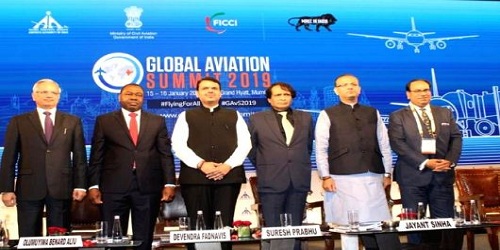On 15th January 2019, the Union Minister for Commerce & Industry and Civil Aviation, Shri Suresh Prabhu inaugurated the 2 day Global Aviation Summit (GAS) 2019 with a theme:‘Flying for all-especially the next 6 Billion’.It is being organised by Ministry of Civil Aviation in association with Airport Authority of India (AAI) and Federation of Indian Chambers of Commerce and Industry (FICCI) in Mumbai.The Summit Concluded on 16th January 2019.

Key Points:
- Devendra Fadnavis, Chief Minister of Maharashtra, Dr Olumuyiwa Benard Aliu, President of the Council ICAO, Jayant Sinha, MoS, Ministry of Civil Aviation, were present in the inaugural session of the summit.
- The Vision 2040 for aviation sector and the Air Cargo Policy was launched during the summit.
- Civil Aviation secretary R N Choubey informed that India would be adding 1,000 aircraft over the next 7-8 years and one billion trips in the next 15 years.
- The domestic aviation market in India has been growing at 20 percent annually for the last four years and this growth has been the highest in the world.
- Maharashtra chief minister Devendra Fadnavis announced that the Navi Mumbai international airport (NMIA) will be ready by the middle of 2020 and is expected to contribute 1% to the country’s GDP.
- The event will also examine the future of drones, sustainable growth of aviation, cargo and logistics in the aviation industry and all the factors behind building great aviation business.
- Around 13 transport and civil aviation ministers, 36 civil aviation authorities, 800 delegates, more than 35 exhibitors from over 80 countries across the world are participating in the summit.
Suresh Prabhu released the Vision 2040 document in the Global Aviation Summit 2019
On 15th January 2019, Union Minister for Commerce & Industry and Civil Aviation, Shri Suresh Prabhu unveiled the Vision 2040 document for aviation sector in the Global Aviation Summit (GAS) 2019, in Mumbai. The document is prepared by consultancy firm KPMG and industry body Federation of Indian Chambers of Commerce and Industry (FICCI) in consultation with the government.
Key Points:
i.The Vision 2040 document aims to have 1.12 billion air passengers in 2040 from 187 million air passengers in 2018. This comprises around 821 million domestic passengers and around 303 million international passengers (to and from India).
ii.It further states that India will need 200 airports and an investment of $40-50 billion to handle at least 1.1 billion passengers flying to, from and within the country.
iii.India, which is currently the seventh-largest aviation market in 2017-18, is expected to become the third-largest by 2022, inching closer to the U.S., which is projected number two. Besides the Indian commercial air fleet is expected to be 2,359 by March 2040.
iv.India will establish its own aircraft leasing industry which may handle almost 90% of aircraft being ordered in India by 2040. Besides India’s tax structure and repossession processes will be equally or more attractive than those in leading global jurisdictions.
v.The incremental land requirement for airport expansion is expected to be around 150,000 acres.
vi.It further said that the government may consider establishing a Nabh Nirman Fund (NNF) with a starting corpus of around $2 billion to support low traffic airports in their initial phases.
vii.The vision document says that aviation sector which employs around five million people in India currently will create a total of 25 million jobs in the country.
viii.Air cargo will reach 17 million MT per annum by 2040, up from 3.35 million MT per annum in 2018.
Recommendations for Growth:
- The document suggested amendments to Land Acquisition, Rehabilitation and Restructuring Act, 2013 and adopting “land-pooling” techniques to develop newer airports.
- Lower Goods and Services Tax (GST) and inclusion of aviation turbine fuel (ATF)under GST at the earliest.
- Airlines must try to reduce dependence on ATF by adopting biofuels and explore issuing masala bonds to raise funds for themselves.
- Some other recommendations include automatic de-registration and repossession system, making registrar repository public, incorporation of ratified CTC 2001 conventions, making taxation of aircraft leasing more attractive and simplification of brown/green field airport agreements.
About Ministry of Civil Aviation:
♦ Minister: Suresh Prabhu
♦ Minister of State: Jayant Sinha
♦ Headquarters: New Delhi
About Federation of Indian Chambers of Commerce & Industry (FICCI):
♦ President: Sandip Somany
♦ Secretary General: Dilip Chenoy
♦ Headquarters: New Delhi
About International Civil Aviation Organization (ICAO):
♦ Headquarters: Montreal, Canada
♦ Secretary General: Dr. Fang Liu
♦ President: Dr. Olumuyiwa Benard Aliu

